Best Practices Articles
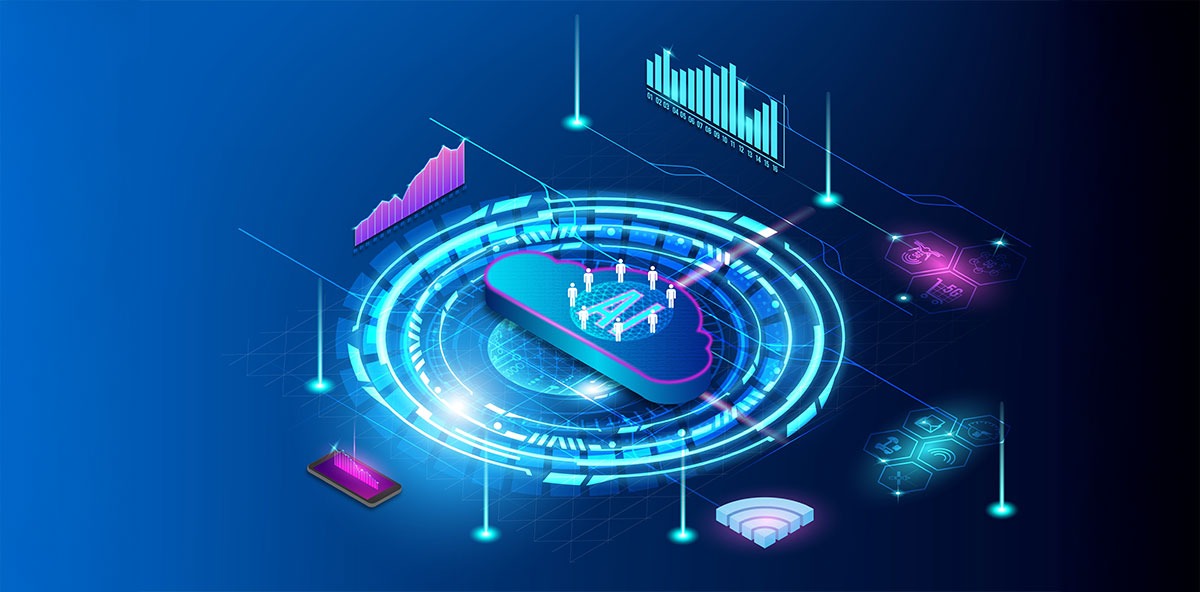
AI is Reshaping the Future of Channel and Partner Marketing
Partner marketing powered by artificial intelligence delivers personalized campaigns, automated execution, data-driven content creation, and predictive performance insights that enable vendors to scale ecosystem engagement without inflating operational costs. Organizations relying on manual channel processes face generic outreach and limited campaign effectiveness.
Artificial intelligence has shifted from a buzzword to an operational necessity. Channel ecosystems now span diverse geographies, industries, and engagement models. Partner marketing harnesses AI to gain agility, precision, and measurable scale.
AI-powered transformation addresses the core challenge of ecosystem complexity directly. Vendors must deliver personalized support without proportional cost increases across partners. Intelligent automation enables dynamic segmentation, responsive delivery, and data-driven customization.
This guide explores five dimensions where AI reshapes partner marketing operations. Each section examines a specific capability that drives measurable competitive advantages. The result is a more intelligent marketing function that elevates partner success.
Key Takeaways
- AI-enabled partner marketing delivers personalized content for each partner type, vertical, and buyer persona.
- Intelligent automation eliminates campaign bottlenecks and enables autonomous execution at ecosystem scale.
- Conversational AI accelerates partner enablement through interactive onboarding and contextual real-time support.
- Generative AI transforms co-marketing by producing tailored campaign assets and dynamic co-branded content.
- Predictive analytics surface hidden performance correlations that optimize resource allocation across partner segments.
How Does AI Enable Personalization at Scale in Partner Marketing?
Traditional channel efforts suffer from generic messaging and static campaigns. These approaches fail to engage partners or resonate with target buyers. AI changes this paradigm by generating personalized assets in real time.
Machine learning models analyze partner behavior and market performance data. They tailor messaging to reflect each partner's value proposition and context. This dynamic personalization increases engagement and drives higher conversion rates consistently.
AI also enables content localization with unprecedented accuracy and speed. Natural language processing adapts campaign materials for regional language and culture. This eliminates delays while ensuring brand consistency across international markets.
Partner marketing benefits from persona-level messaging within each partner segment. Vendors deliver tailored experiences for marketing, sales, and technical contacts. This granularity improves communication efficacy and strengthens cross-functional partner alignment.
In practical terms, partners receive content aligned with their strengths. A mid-market services firm gets demand generation kits for their industry. A global systems integrator receives strategic co-branding assets with analytics dashboards.
How Does Intelligent Automation Transform Partner Marketing Execution?
Modern channel ecosystems require marketing systems that learn and adapt continuously. AI extends automation by introducing predictive analytics and intelligent routing. These functions remove bottlenecks and free teams to focus on strategy.
Predictive AI identifies which partners will succeed with specific campaigns. It analyzes historical data, engagement patterns, and customer fit for prioritization. This ensures better resource allocation and higher return on partner marketing investments.
Intelligent routing matches leads and content assets to appropriate partners. The system delivers the right resource at the optimal moment automatically. This precision eliminates manual distribution errors and accelerates campaign activation timelines.
Autonomous execution reduces operational friction across the entire campaign lifecycle. AI tools launch campaigns, adjust messaging, and shift budget allocations independently. The system continuously refines tactics to maximize impact as results flow.
AI-enhanced workflows synchronize with CRM and partner relationship management systems. This integration eliminates silos and accelerates response times across departments. Unified reporting provides end-to-end visibility from marketing through closed deals.
How Does AI Accelerate Partner Enablement and Support Programs?
AI revolutionizes partner enablement by making it interactive and contextual. Conversational AI guides partners through onboarding, training, and campaign setup. These tools offer real-time assistance and reduce reliance on human support.
Organizations assess partner readiness through AI-driven maturity analysis continuously. Systems recommend tailored enablement journeys based on engagement and certification data. High-potential partners receive advanced tools while others get foundational support.
AI-driven learning systems adapt training modules based on individual partner behavior. Partners struggling with campaign setup receive additional guidance and walkthroughs. Those who excel gain access to more advanced certification programs automatically.
Partner marketing programs benefit from AI-powered knowledge management capabilities significantly. Intelligent search helps partners access case studies and documentation instantly. Machine learning improves these systems by analyzing search intent and usage.
This targeted development approach fosters a more capable partner base. Faster ramp-up times translate directly to earlier revenue contribution from partners. The enablement engine scales responsively without requiring proportional support staff increases.
How Does AI Transform Content Creation and Co-Marketing with Partners?
Generative AI models produce campaign copy and collateral for specific audiences. These tools reduce creative bottlenecks across the partner marketing workflow significantly. Partners launch timely and relevant campaigns without waiting for vendor resources.
AI enhances content strategy by analyzing engagement data and search trends. It identifies which topics and formats perform best across partner segments. Vendors and partners align messaging to current market demand using these insights.
Dynamic co-branding represents a transformative capability for partner marketing programs. Partners input logos, value propositions, and customer stories into templated assets. The system customizes and outputs materials in multiple formats instantly.
Personalized microsites and landing pages represent another AI-driven frontier. The system dynamically generates digital destinations tailored to specific customer profiles. These pages showcase partner-specific solutions, proof points, and targeted calls to action.
As visitors interact with these pages, AI adjusts content to reflect intent. This real-time optimization increases conversion potential across every digital touchpoint. Campaign velocity improves because partners produce professional materials without design dependencies.
How Do Intelligent Insights Optimize Partner Marketing Performance?
Measurement has always been a significant challenge in partner marketing programs. AI brings clarity by automating attribution across multiple data systems automatically. Predictive dashboards visualize partner impact across campaigns, segments, and regions clearly.
AI surfaces trends that human analysts might overlook during manual reviews. It identifies correlations between training completion and deal velocity precisely. Content engagement patterns reveal connections to lead quality that inform strategy.
Real-time feedback loops enhance accountability for both vendors and partners. Partners see how their efforts impact results through transparent performance dashboards. Vendors gain visibility into what enables high performance across the ecosystem.
These shared insights strengthen trust and facilitate data-driven joint planning. Partner marketing evolves from a reactive function to a strategic intelligence engine. Companies continuously optimize programs and reallocate resources where they create value.
AI supports scenario modeling and forecasting for strategic planning purposes. Companies simulate campaign outcomes, budget adjustments, or partner tier changes proactively. This predictive capability improves planning and supports agile decision-making across ecosystems.
| Capability | Traditional Partner Marketing | AI-Powered Partner Marketing |
|---|---|---|
| Content personalization | Generic assets distributed uniformly | Dynamic content tailored per partner and persona |
| Campaign execution | Manual launch and monitoring | Autonomous deployment with real-time optimization |
| Partner enablement | Static training and documentation | Adaptive learning with conversational AI support |
| Co-branding | Manual design with slow turnaround | Instant templated output in multiple formats |
| Performance measurement | Manual reporting and reconciliation | Automated attribution with predictive dashboards |
| Lead routing | Rule-based manual distribution | Intelligent matching at optimal moments |
| Scalability | Linear growth tied to headcount | Exponential growth through automation |
How Does ZINFI Support AI-Powered Partner Marketing at Scale?
ZINFI provides a comprehensive partner marketing platform with integrated AI capabilities. The system automates campaign execution, content personalization, and performance analytics centrally. A unified interface delivers operational simplicity across all ecosystem marketing functions.
The platform leverages AI to deliver measurable partner marketing outcomes consistently. Intelligent automation handles campaign routing, asset customization, and budget optimization. Program managers focus on strategy while the system executes at scale.
- AI-powered personalization. Dynamic content generation tailored to partner type, vertical, and buyer persona.
- Intelligent campaign automation. Predictive routing and autonomous execution that eliminates manual campaign bottlenecks.
- Conversational enablement. AI assistants guide partners through onboarding, training, and campaign setup in real time.
- Generative co-marketing tools. Automated content creation with dynamic co-branding and multi-format asset output.
- Predictive analytics. Attribution dashboards surface performance correlations and forecast campaign outcomes accurately.
- Scalable ecosystem support. Platform architecture supports unlimited partners across geographies and engagement models.
Frequently Asked Questions
1. How does AI improve partner marketing personalization?
AI analyzes partner behavior and market data to generate tailored content for each partner type, vertical, and buyer persona.
2. What role does predictive analytics play in partner marketing?
Predictive analytics identifies which partners and campaigns will generate the highest returns based on historical performance data.
3. How does AI automate campaign execution for partners?
AI tools launch campaigns, adjust messaging, and shift budgets autonomously based on real-time performance signals and patterns.
4. What is AI-driven partner enablement?
Conversational AI guides partners through onboarding and training while adaptive learning systems customize content based on behavior.
5. How does generative AI support co-marketing efforts?
Generative AI produces campaign copy, co-branded assets, and personalized landing pages tailored to specific audiences and objectives.
6. What performance insights does AI provide for partner marketing?
AI automates attribution, surfaces hidden trend correlations, and visualizes partner impact through predictive dashboards across regions.
7. How does AI handle content localization across markets?
Natural language processing adapts campaign materials for regional language and cultural nuances while ensuring brand consistency globally.
8. Can AI support scenario modeling for partner programs?
Yes. Companies simulate campaign outcomes, budget adjustments, and partner tier changes to anticipate impact before implementation.
9. How does AI reduce partner marketing operational costs?
Autonomous execution eliminates manual tasks while intelligent routing ensures resources reach the right partners at optimal times.
10. How does ZINFI's platform leverage AI for partner marketing?
ZINFI integrates AI-powered personalization, campaign automation, generative co-marketing, and predictive analytics in a unified platform.
About the author
Sugata Sanyal
Sugata loves solving complex industry problems in a way that creates hundreds of new jobs and opportunities. Over the past three decades, Sugata has worked in three large Fortune 100 organizations – Honeywell, Philips, and Dell SonicWALL – learning how to put together global teams that can work together to help customers win, create a wealth of new opportunities, and do amazing things. Sugata founded ZINFI with the mission of solving the entire challenge of marketing and selling, both directly and indirectly, through the channel. Over the past several years, his leadership on the ZINFI team has built a highly customer-focused global organization that constantly innovates and always asks how it can do better and deliver more for less.
Best Practices Guides
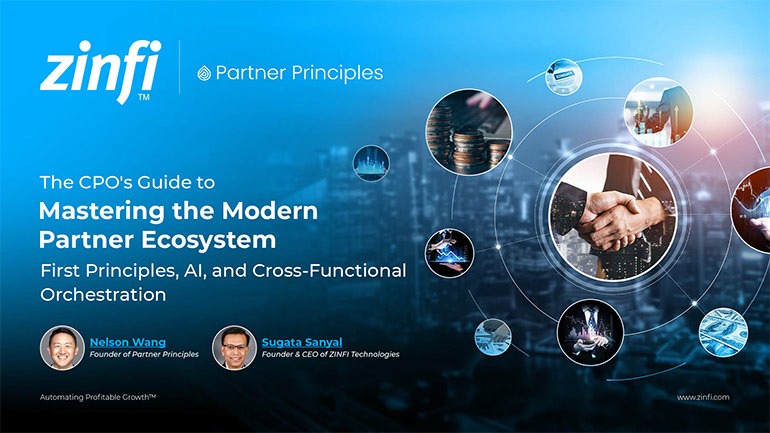 First Principles Drive Modern Partner Ecosystem Success Best Practices
First Principles Drive Modern Partner Ecosystem Success Best PracticesDownload for FREE
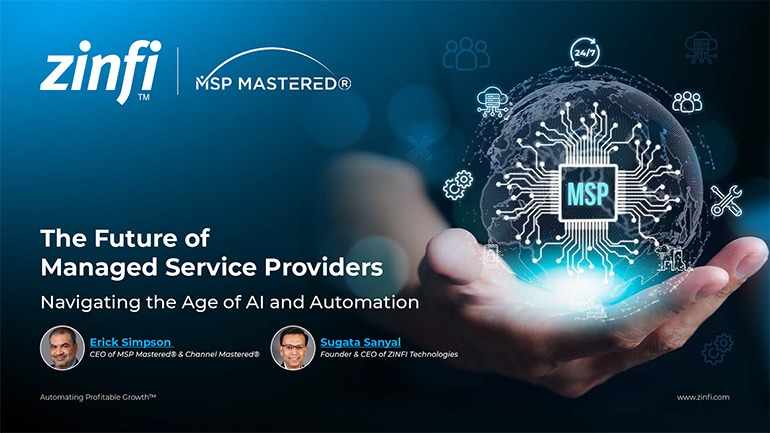 The Future of Managed Service Providers: Navigating the Age of AI and Automation
The Future of Managed Service Providers: Navigating the Age of AI and AutomationDownload for FREE
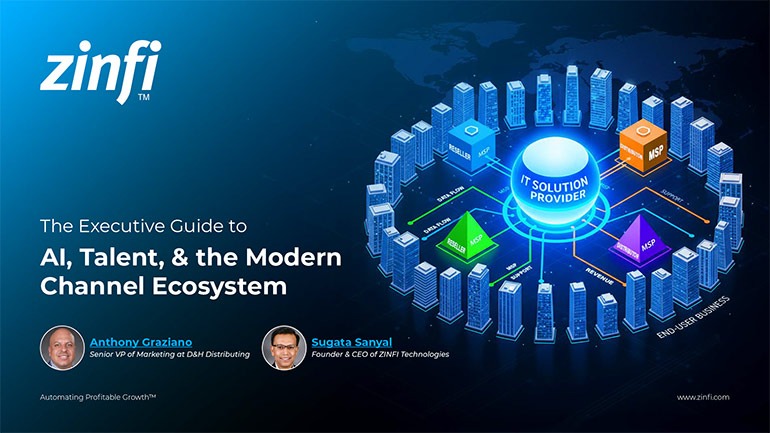 Modernizing Channel Marketing: AI and Ecosystem Enablement Best Practices
Modernizing Channel Marketing: AI and Ecosystem Enablement Best PracticesDownload for FREE
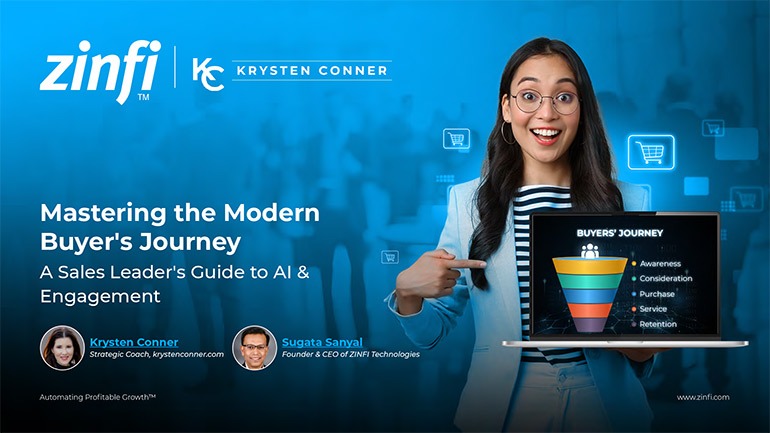 The Channel’s Shift to Partner-Led With AI Best Practices
The Channel’s Shift to Partner-Led With AI Best PracticesDownload for FREE
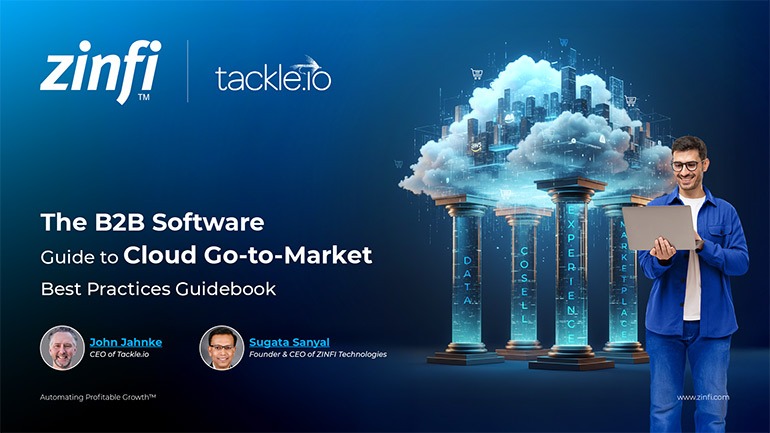 Hyperscalers, ISVs, and AI: Shaping the Future of B2B Software Distribution
Hyperscalers, ISVs, and AI: Shaping the Future of B2B Software DistributionDownload for FREE
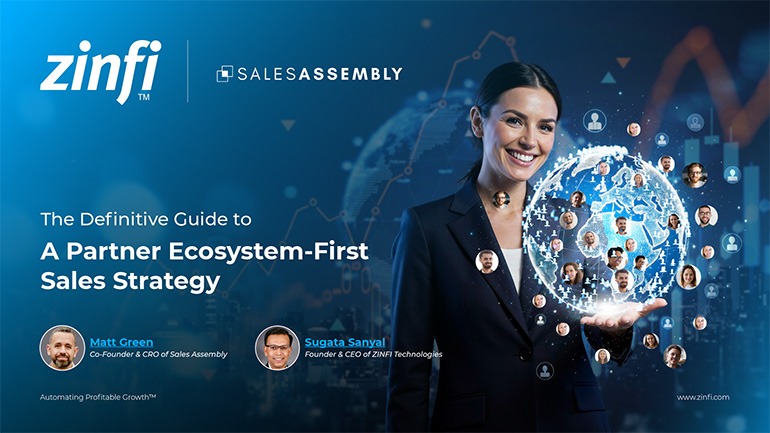 Definitive Guide to a Partner Ecosystem-First Sales Strategy
Definitive Guide to a Partner Ecosystem-First Sales StrategyDownload for FREE
 The Partner-Led Digital and AI Transformation Best Practices
The Partner-Led Digital and AI Transformation Best PracticesDownload for FREE
 Startup Talent Recruitment: Hiring Missionaries, Not Mercenaries
Startup Talent Recruitment: Hiring Missionaries, Not MercenariesDownload for FREE
 The Future of Partner Relationship Management with AI in Partnerships
The Future of Partner Relationship Management with AI in PartnershipsDownload for FREE
 Cybersecurity for the 99%: Strategies from the Frontline
Cybersecurity for the 99%: Strategies from the FrontlineDownload for FREE
 Mastering Partner Relationships: A Strategic Approach to Business Growth
Mastering Partner Relationships: A Strategic Approach to Business GrowthDownload for FREE
 Mastering Partner Relationship Management: Keys to SaaS Channel Success
Mastering Partner Relationship Management: Keys to SaaS Channel SuccessDownload for FREE